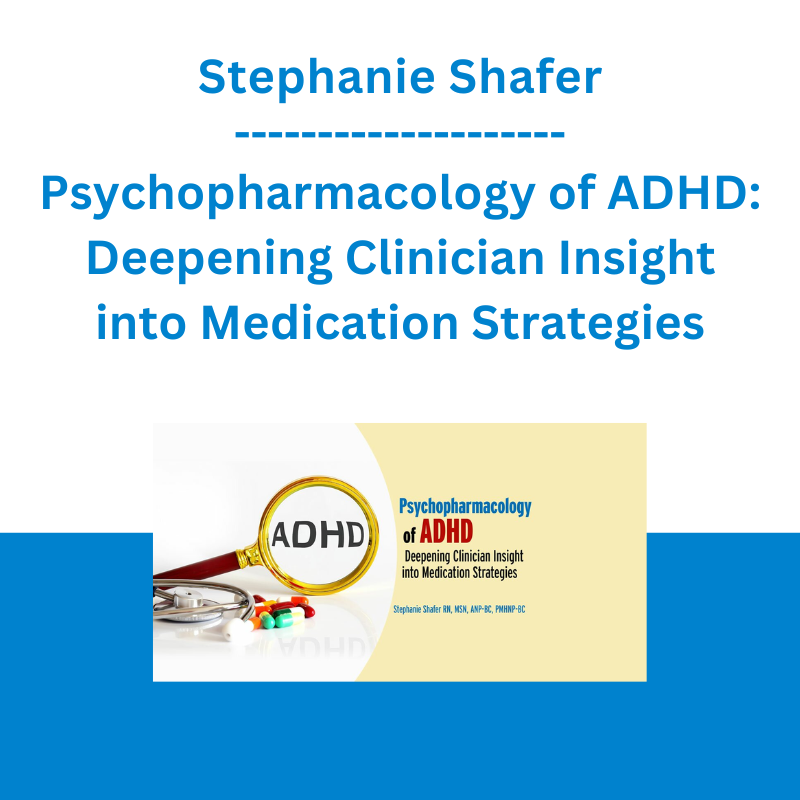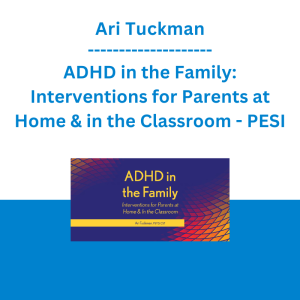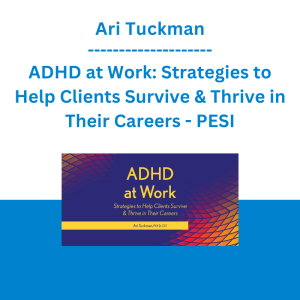*** Proof of Product ***
Exploring the Essential Features of “Stephanie Shafer – Psychopharmacology of ADHD: Deepening Clinician Insight into Medication Strategies”
Speaker: Stephanie L. Shafer, MSN, ANP-BC, PMHNP-BC
Duration: 2 Hours 03 Minutes
Format: Audio and Video
Copyright: Mar 21, 2024
Media Type: Digital Seminar
Description
Stephanie Shafer, MSN, ANP-BC, PMHNP-BC, will deliver an advanced and updated review of stimulant (e.g., methylphenidate, amphetamines) and non-stimulant (e.g., atomoxetine, guanfacine) medications, with a particular focus on understanding the mechanisms of action, how they differ, and how one might synergistically compliment another. Learn how these medications affect the brain’s chemistry and function to alleviate ADHD symptoms, allowing for a deeper appreciation of their therapeutic potential. Central to the discussion will be the identification of presenting symptomatology and the evaluating of treatment outcomes. This focus will provide the knowledge and skills needed to adeptly navigate the evolving landscape of ADHD management.
By the talk’s conclusion, you will possess a robust understanding of ADHD’s neurobiological basis, as well as a comprehensive knowledge of the mechanisms by which available medications act. Deliver personalizing care for patients with ADHD to enhance their quality of life and daily functioning to the future.
Speaker
Stephanie L. Shafer, MSN, ANP-BC, PMHNP-BC, works in a large private practice in Lansing, MI, providing clinical services to children, adolescents, and adults with psychiatric disorders, including ADHD, Bipolar Disorder, Depression, Anxiety, Obsessive-compulsive tendencies, Schizophrenia, Autism Spectrum Disorder, Traumatic Brain Injury, PTSD, and Personality Disorders. She has achieved considerable success treating these conditions. This success has largely resulted from the development of a structured model of care that includes a significant focus on clinical and background histories, identifying psychosocial stressors, and evaluating prior medical and psychiatric diagnoses (and treatment regimens associated with these conditions). This approach and model of medical management is essential to the effective delivery of psychiatric medications to this population.
From a clinical perspective, Stephanie has worked in a myriad of settings, including emergency medicine, primary care, and psychiatry, within a large urban hospital, community-based practice, clinics, and in a private-practice setting. Her transition from primary care to psychiatry evolved as a means of providing effective treatment for a growing population of underserved patients with psychiatric disorders.
Stephanie’s commitment to her specialty is evident. She completed a post-graduate degree specializing in psychiatry at Johns Hopkins University in Baltimore, MD, earned her Psychiatric Mental Health Nurse Practitioner certificate, and is a requested presenter, sharing her expertise with multidisciplinary healthcare audiences throughout the country.
Speaker Disclosures:
Financial: Stephanie Shafer is the owner and founder of Neurobehavioral Health and Wellness. She receives a speaking honorarium and recording royalties from PESI, Inc. She has no relevant financial relationships with ineligible organizations.
Non-financial: Stephanie Shafer is a member of the American Association of Nurse Practitioners.
Objectives
- Explain the key neurobiological factors involved in ADHD, including neurotransmitter systems, brain regions implicated, and how they contribute to the symptoms of the disorder.
- Evaluate the pharmacological treatments available for ADHD, including stimulant medications (e.g., methylphenidate, amphetamines) and non-stimulant mediations (e.g., atomoxetine, guanfacine).
- Differentiate ADHD from common differentials and tailor pharmacotherapy to individual patients.
- Analyze the effectiveness of ADHD medications, while also considering potential side effects.
Outline
Neurobiology of ADHD
- Neurotransmitter systems
- Brain regions implicated
- Contribution to symptoms
Examine Pharmacological Treatment Options
- Stimulant medications
- Methylphenidate
- Amphetamines
- Non-stimulant medications
- Atomoxetine
- Guanfacine, etc.
- Mechanisms of action
- Efficacy and effectiveness
- Differences and combinations
Individualized Treatment Strategies
- Differential diagnosis
- Distinguish ADHD from common differentials
- Consideration of comorbid psychiatric conditions
- Tailoring pharmacotherapy
- Customize treatment plans based on individual patient profiles
- Adjust dosage and medication type as needed
- Address overlapping symptomatology
- Strategies to manage symptoms that overlap with other disorders
- Coordinate care with other healthcare providers
Evaluate Treatment Outcomes & Side Effects
- Effectiveness of Medications
- Reduction of ADHD symptoms
- Improvement in daily functioning
- Cognitive and emotional beliefs
- Side Effects
- Common side effects of ADHD medications
- Strategies to minimize side effects
Please see the full list of alternative group-buy courses available here: https://lunacourse.com/shop/










 The Daily Traders – Exclusive Trading Mentorship Group
The Daily Traders – Exclusive Trading Mentorship Group  George Fontanills & Tom Gentile - Optionetics 6 DVD Series Home Study Course (Digital Download)
George Fontanills & Tom Gentile - Optionetics 6 DVD Series Home Study Course (Digital Download)  Akil Stokes & Jason Graystone - TierOneTrading - Trading Edge 2019
Akil Stokes & Jason Graystone - TierOneTrading - Trading Edge 2019  Ning Li - Zero To $5K Copywriting Course
Ning Li - Zero To $5K Copywriting Course  Money Miracle - George Angell - Use Other Peoples Money To Make You Rich
Money Miracle - George Angell - Use Other Peoples Money To Make You Rich  Erik Banks - Alternative Risk Transfer
Erik Banks - Alternative Risk Transfer  Oliver Velez - Essential Strategy Of Trade For Life
Oliver Velez - Essential Strategy Of Trade For Life  George Fontanills & Tom Gentile - Optionetics Wealth Without Worry Course
George Fontanills & Tom Gentile - Optionetics Wealth Without Worry Course  Chris Capre - Advanced Price Action Ongoing Training & Webinars
Chris Capre - Advanced Price Action Ongoing Training & Webinars  Atlas API Training - API 570 Exam Prep Training Course
Atlas API Training - API 570 Exam Prep Training Course  Ari Tuckman - ADHD in the Family: Interventions for Parents at Home & in the Classroom - PESI
Ari Tuckman - ADHD in the Family: Interventions for Parents at Home & in the Classroom - PESI  Toshko Raychev - Profit System + ITF Assistant
Toshko Raychev - Profit System + ITF Assistant  Alphashark - The AlphaShark SV-Scalper
Alphashark - The AlphaShark SV-Scalper  Forexmentor - Recurring Forex Patterns
Forexmentor - Recurring Forex Patterns  SMB - Options Training
SMB - Options Training  Jesse Livermore Trading System - Joe Marwood
Jesse Livermore Trading System - Joe Marwood  Ari Tuckman - ADHD at Work: Strategies to Help Clients Survive & Thrive in Their Careers - PESI
Ari Tuckman - ADHD at Work: Strategies to Help Clients Survive & Thrive in Their Careers - PESI  Matthew Kratter - Trader University
Matthew Kratter - Trader University